- Home
- Mary Downing Hahn
Anna All Year Round
Anna All Year Round Read online
Anna All Year Round
Mary Downing Hahn
* * *
Illustrated by Diane deGroat
* * *
CLARION BOOKS/New York
* * *
Clarion Books
a Houghton Mifflin Company imprint
215 Park Avenue South, New York, NY 10003
Text copyright © 1999 by Mary Downing Hahn
Illustrations copyright © 1999 by Diane deGroat
Type is 15/18.5-point Garamond 3
The illustrations for this book are executed in pencil.
All rights reserved.
For information about permission to reproduce selections from this book, write to Permissions,
Houghton Mifflin Company, 215 Park Avenue South, New York, NY 10003.
Printed in the USA.
Library of Congress Cataloging-in-Publication Data
Hahn, Mary Downing.
Anna all year round / by Mary Downing Hahn; illustrated by Diane deGroat.
p. cm.
Summary: Eight-year-old Anna experiences a series of episodes, some chat are funny, others sad, involving
friends and family during a year in Baltimore just before World War I.
ISBN 0-395-86975-7
[1. Family life—Baltimore (Md.)—Fiction. 2. Baltimore (Md.)—Fiction.] I. DeGroat, Diane, ill. II. Title.
PZ7.H1256An 1999
[Fic]—dc21 98-19985
CIP
AC
QUM 10 9 8 7
* * *
For my mother, the real Anna, with love and
gratitude for sharing your stories
* * *
Contents
Fall
1 The Language of Secrets • [>]
2 Numbers, Numbers, Numbers • [>]
3 Anna's New Coat • [>]
Winter
4 Rosa's Birthday Party • [>]
5 Christmas Wishes • [>]
6 Anna's Birthday Surprise • [>]
Spring
7 Stitches! • [>]
8 Fritzi and Duke • [>]
9 Great Aunt Emma Moree and
the Burglar • [>]
Summer
10 The Trolley Ride • [>]
11 Ladyfingers • [>]
Afterword • [>]
German Words and Phrases • [>]
Fall
1. The Language of Secrets
ANNA IS SITTING ON THE SOFA READING. IT'S A RAINY September day. Drops of water run down the front window, blurring the narrow brick row houses across the street. Leaves drift from the trees. The clock on the mantel chimes eleven. At the same moment, a horse clip-clops past, hauling a wagon.
Without looking up from her book, Anna knows it's Mr. Hausmann, the grocer, on his way to his shop at the bottom of the hill. He finishes his deliveries every Saturday morning at exactly the same time. Father says he could set all the clocks in the house by Mr. Hausmann.
Tired of sitting still, Anna slides quietly off the sofa and tiptoes down the hall to the kitchen door. Mother's sister, Anna's aunt May, has come over from her house next door. She and Mother are sitting at the table, drinking coffee and gossiping about their other sisters. Fritzi, Aunt May's big white bulldog, is asleep at Aunt May's feet.
Anna stands in the doorway listening. Mother has five sisters and three brothers. It seems to Anna that someone in the family is always mad at someone else. This morning the two sisters are cross with Aunt Amelia. Anna isn't fond of Aunt Amelia, so she lingers, hoping to hear something interesting.
"Did you hear what Amelia had the nerve to tell Margaret?" Mother asks Aunt May. "She said her tablecloth wasn't starched properly!"
This doesn't surprise Anna. Once she saw Aunt Amelia run her finger across their dining-room table to check for dust. As if Mother would leave a speck of dirt anywhere! Why, she even sweeps the sidewalk in front of the house every morning. With Mother around, dust has no chance.
Aunt May makes a loud harrumph. "Amelia should talk. The last time I called on her, I counted three cobwebs in the corners. Poor Friedrich. I can't believe she's a good wife to him."
Mother nods in agreement and leans closer to Aunt May. "What do you think of Julianna's new beau? Have you met him yet?"
Aunt May wrinkles her nose. "I don't—"
Just then, Anna has the misfortune to sneeze.
Mother and Aunt May both turn and stare at Anna. Until now, they hadn't noticed her standing in the doorway.
Mother looks cross. "Fie, Anna. Where are your manners? It's rude to eavesdrop."
Aunt May smiles. "My little sweet potato has sprouted ears as well as eyes," she says, giving Anna a hug. Fritzi lifts his head and wags his tail. Like Aunt May, he's glad to see Anna.
Mother doesn't smile. She picks up the coffeepot and holds it over Aunt May's cup. "Mochtest du mehr Kaffee, May?"
Aunt May winks at Mother and pats Anna's fanny. "Ja bitte, Lizzie."
Anna pulls away from her aunt and scowls. Mother's family is German. When they don't want Anna to understand what they're saying, they speak in German. No one will teach Anna to speak it. It's the language of secrets.
"Was denkst du von Julianna's neuem Freund?" Mother asks.
Aunt May makes a face. "Ich mag ihn nicht."
Anna tugs at Mother's sleeve. "Speak English," she begs.
Mother shakes her head. "Go and play, Anna. What we say is not for you to hear."
"It's talk for grownups, very boring." Aunt May gives Anna another pat. "Do as Mother says and run along, mein kleiner Zuckerwürfel."
Anna flounces to the door. When she's sure neither her mother nor her aunt is looking at her, she sticks out her tongue. She wants to be called my little sugar lump, not mein kleiner Zuckerwürfel.
Fritzi starts to follow Anna, but Aunt May calls him back. Mother doesn't allow Fritzi to leave the kitchen; she's afraid he'll jump on the furniture the way he does at home. Although Mother has never said it to Aunt May's face, she doesn't like Fritzi. She thinks he's ugly and smelly and spoiled rotten.
Alone in the parlor, Anna finds a book written in German. She sits in Father's big chair and opens the book. Since no one else will do it, Anna will teach herself German. She stares at the long words till her head aches. She cannot understand any of them. Some of the letters look strange. Others have funny marks over them.
Anna groans and closes the book. German children must be smarter than American children, she thinks, or they'd never learn to talk or read.
When Father comes home from his job at the newspaper, he finds Anna asleep in his chair, Mother's German book in her lap.
Anna opens her eyes and gives Father a hug and a kiss. Father picks up Mother's book and glances at the pages. "I didn't know you could read German," he says.
Anna sighs. "That's just the trouble, Father. I can't! I was trying to teach myself, but it's too hard. Why can't German be as easy as English? Why do all the words have to be so long and fancified?"
Father smiles. "I imagine that's exactly what German children say about English."
Anna loves Father too much to argue but she's certain he's wrong. Anyone can see English is much easier than German.
Father strokes Anna's long brown hair. "Won't Mother help you?"
Anna shakes her head. "All Mother has taught me is 'Gesundheit which you say when someone sneezes, and 'Auf Wiedersehen,' which means 'good-bye.' I also know 'bitte,' which means 'please,' and 'danke,' which means 'thank you.'"
"Those are all good words," Father says. "Why do you want to know more?"
Anna picks up her doll and smoothes its wrinkled dress. "When Aunt May visits, she and Mother talk in German to keep me from learning the
ir secrets."
Father chuckles, and Anna lays down her doll and stares at him. "Will you teach me German?"
Father laughs. "I don't know any more German than you do. Your mother's parents were born in Germany, but my mother and father were born right here in Baltimore. So were my grandparents. As far as I know, no one in my family has ever spoken anything but English."
Anna rests her head on Father's shoulder. "I guess Mother doesn't want you to learn her secrets either."
Father smiles. "I never thought of that, Anna."
***
That night, Father reads a chapter of The Swiss Family Robinson to Anna. Mother sits nearby, hemming a new shirt for Father. Her needle flashes swiftly in and out of the cloth, making tiny stitches. It's a quiet, peaceful time. The fall evening has wrapped its soft arms around the houses on Warwick Avenue, hushing everything.
Father catches Anna yawning. "Time for bed," he says. Leaning close, he whispers something in her ear.
Anna walks to Mother and gives her a good-night kiss. "Gute Nacht, Mutter" she says, carefully repeating what Father has just told her.
Mother stares at Anna in surprise. "Sprichst du Deutsch, Anna?" she asks. "Can you speak German now?"
Anna glances at Father and giggles. "Father taught me. 'Gute Nacht, Mutter' means 'good night, Mother.'"
Mother turns to Father. "Ira, when did you learn German?"
Father laughs. "Oh, I've picked up a few words here and there, but don't worry, Lizzie. Your secrets are safe."
Mother smiles and draws Anna close to whisper in her ear. Anna goes to Father. "Gute Nacht, Mutter," she says, repeating what Mother has just told her.
Father winks at Mother. "Gute Nacht, Tochter," he says, kissing Anna good night.
Anna leaves Mother and Father in the parlor and goes upstairs to her room. The moon shines through the skylight over her bed. Anna wonders how to say "moon" in German.
Maybe she'll ask Mother tomorrow. Like Father, she'll pick up a few words here and there. Then one day, when no one expects it, she'll join the secret conversation. Won't that surprise her mother and her aunts?
2. Numbers, Numbers, Numbers
THE HOUSES ON ANNA'S STREET MARCH DOWNHILL IN neat rows as far as you can see. Each one has three white marble steps in front, a double window downstairs, and three windows upstairs. Inside, they are just the same. All have three rooms on each floor, plus a bathroom and a pantry. The backyards are long and narrow and separated from each other by tall white fences.
Many children live on Anna's street, but only five are Anna's age. Rosa Schuman lives two doors up, on the other side of Aunt May. Beatrice Morgan's house is at the top of the hill. Wally Heinz's house is at the bottom of the hill. Patrick Reilly lives next door to Wally, and Charlie Murphy lives across the street from Anna.
Rosa and Beatrice are best friends. They go everywhere together, holding hands and giggling. Sometimes they let Anna play with them, especially if they need her to turn the jump rope. Sometimes they tell her to go home. "Two's company," Rosa says, squeezing Beatrice's hand, "but three's a crowd."
Anna doesn't care. Rosa and Beatrice are silly, boring girls. They never do anything but play jacks and jump rope and take their dolls for walks. Anna would rather roller-skate with Charlie Murphy any day. Unlike Anna, Charlie has lots of brothers and sisters, some older than he is and some younger. Once in a while Anna wishes she had a big family like Charlie's, but usually she's happy to have Father and Mother all to herself.
This year, Charlie, Patrick, Wally, Beatrice, Rosa, and Anna are in the third grade. They go to Public School 62, a tall red-brick building just down the street from Anna's house. It's three stories high, much bigger than any house in the neighborhood. When Anna started first grade, she often got lost trying to find her classroom, but now that she's eight, she knows her way around.
Anna's teacher, Miss Levine, has divided the class into two sections: a high third for the smart children and a low third for the others. Anna is in the high third. She has more gold stars on her chart than any other child.
Anna is very proud of those stars. So are Mother and Father. Mother tells Aunt May that Anna is "ein kluges Mädchen," a clever girl. Aunt May is proud, too.
Wally, Rosa, and Beatrice are also in the high third, but Patrick and Charlie are in the low. Anna feels sorry for Charlie, but he and Patrick don't care. They hate school.
One day in October Miss Levine decides the high third is ready for long division. "Suppose we have 483 oranges," she says. "And we want to divide them among 23 boys and girls. This is how we do it."
Anna watches Miss Levine's chalk fly across the blackboard as she shows the children how to divide the oranges. Ever since Anna started school, she's been a top reader but she's always had trouble with arithmetic. In her opinion, numbers are much harder than letters. And not nearly as interesting. All you can do with numbers is make problems. But you can make stories and poems with words. Stories and poems are definitely more fun than problems.
"There!" Miss Levine turns to the class with a big smile. "Each of you smart children would get twenty-one nice juicy oranges! Do you see what I did to find the solution?"
Anna nods her head like the other children. Nothing Miss Levine has said or done makes sense to her, but Anna is afraid to raise her hand and ask a question. Miss Levine might think Anna does not belong in the high third.
Rosa sits beside Anna. She cannot read as well as Anna but she is very good with numbers. Anna is afraid she will lose her place at the top of the class to Rosa.
Instead of asking Miss Levine for help, Anna secretly copies Rosa's work. If Rosa knew what Anna was doing, she'd tell the teacher or cover her problems with her hand, so Anna is careful not to be caught. She feels bad about doing this, but she cannot risk telling Miss Levine she doesn't understand long division.
No one catches Anna until the day Miss Levine sends the children to the blackboard in groups of four. She tells them they are going to have long division races. Whoever solves the problem first will receive a gold star. Anna knows she will not get one today.
Miss Levine says, "The dividend is 6281. The divisor is 47. When you find the quotient, go to your seat."
The four children write the problem on the blackboard. Anna is so nervous she drops her stick of chalk. While she's picking it up, she steals a peek at Rosa's work, but she cannot see it well enough to copy from it.
Anna stares at the numbers she's written on the blackboard. On both sides, she hears the clatter of chalk as Rosa, Wally, and Eunice zip through the problem. What Anna writes is wrong. She erases the numbers with her hand and starts again. It is still wrong. She rubs it out. The sweat on her hands makes the blackboard slippery. Her chalk won't stick to it.
Rosa finishes first and goes to her desk. She smirks as she passes Anna. Wally finishes. Eunice finishes. But Anna is still rubbing out numbers and trying to write new ones. Behind her back, children begin to giggle.
Anna's hand shakes. Her knees tremble. Tears fill her eyes. Miss Levine must know the truth now. Anna does not understand long division. She will be sent to the low third with Charlie. She will never receive a gold star again. Mother will have nothing to brag to Aunt May about. Worst of all, Father will be disappointed.
Finally Miss Levine takes the chalk from Anna. "Go to your seat," she says crossly. "You will remain inside at recess."
Before Charlie leaves, he drops a note in Anna's lap. It says, Dere Anna, Im sory yor in trubbel. I will by you a jaw braker after skool. Yor frend Charlie.
When the classroom is empty, Miss Levine sends Anna to the blackboard and gives her a new problem. "Perhaps you can work better when no one is watching you," she says.
Anna cannot do the problem, so Miss Levine gives her another one. And another. And then another. Anna cannot do any of the problems.
Miss Levine gives Anna one more chance. "Suppose I have 245 apples," she says. "How can I divide them among 11 children?"
Anna begin
s to cry. She wants to ask Miss Levine why she has so many apples. She wants to ask her why she wants to divide them up among the children. She wants to know if she, Anna, would get an apple. But she just stands there, crying.
Miss Levine scowls at Anna. "Tell me the truth," she says. "Have you been copying Rosa Schuman's answers?"
Anna twists her hands. She cannot look at Miss Levine. "Yes," she whispers.
"Anna Elisabeth Sherwood, I am ashamed of you," Miss Levine says. "Take your things and move to the back of the room. Until you learn long division, you will remain in the low third."
Still crying, Anna empties her desk. What will she tell Father and Mother?
When the children come in from recess, they are surprised to see Anna sitting in the back of the room. Rosa whispers something in Beatrice's ear that makes both girls giggle, but Charlie pats Anna's shoulder. "Don't worry," he tells Anna. "You won't stay here long. You're much too smart."
Anna hopes Charlie is right.
***
After dinner that night, Anna makes up the silliest problem she can think of. "If you had 517 bananas and you wanted to divide them among 28 monkeys, how would you do it?" she asks Father.
Father thinks a moment. "Why, I suppose I'd throw them all up in the air," he says at last, "and sit back and watch the fun."
Anna frowns. This is not the time for Father's jokes. "Please tell me how to divide 517 by 28," she says.
Father takes the pencil Anna hands him and begins to write. He shows Anna more than one way to divide. He lets her decide which method she understands best. Then he watches her work.
Finally Father says, "Why didn't you tell me you're having trouble with long division, Anna?"
"I was ashamed," she whispers. "I was scared you'd think I wasn't smart after all."
"Oh, Anna," Father says. "We all have trouble understanding things sometimes. You're only eight years old. I don't expect you to know everything."

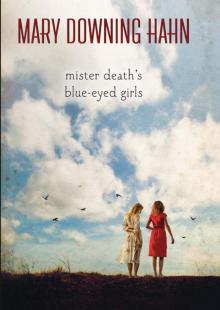 Mister Death's Blue-Eyed Girls
Mister Death's Blue-Eyed Girls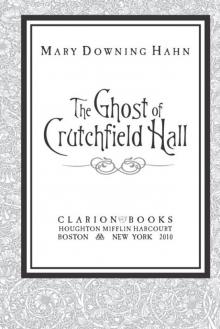 The Ghost of Crutchfield Hall
The Ghost of Crutchfield Hall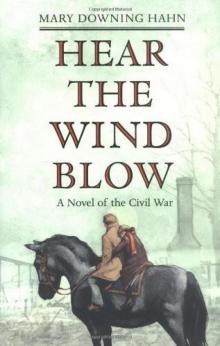 Hear the Wind Blow
Hear the Wind Blow Time of the Witch
Time of the Witch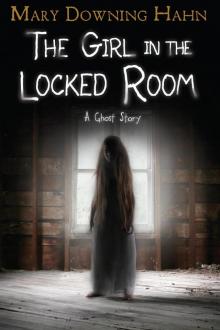 The Girl in the Locked Room: A Ghost Story
The Girl in the Locked Room: A Ghost Story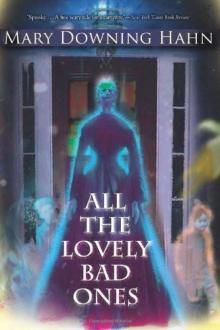 All the Lovely Bad Ones
All the Lovely Bad Ones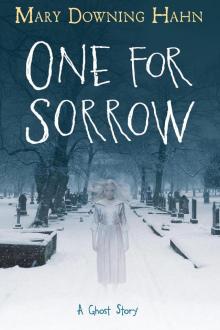 One for Sorrow
One for Sorrow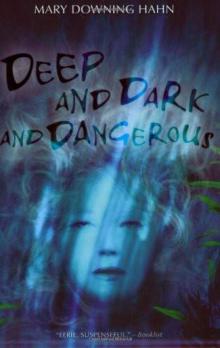 Deep and Dark and Dangerous
Deep and Dark and Dangerous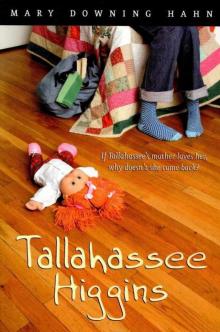 Tallahassee Higgins
Tallahassee Higgins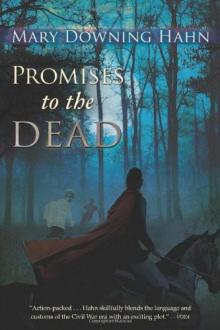 Promises to the Dead
Promises to the Dead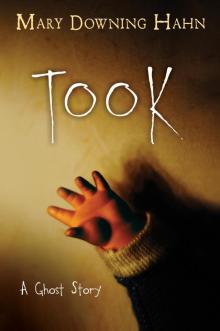 Took: A Ghost Story
Took: A Ghost Story Following My Own Footsteps
Following My Own Footsteps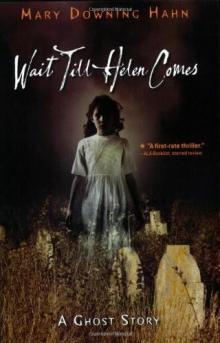 Wait Till Helen Comes: A Ghost Story
Wait Till Helen Comes: A Ghost Story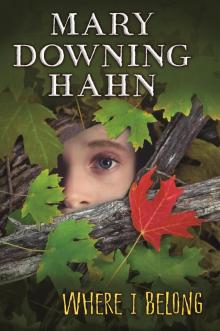 Where I Belong
Where I Belong The Spanish Kidnapping Disaster
The Spanish Kidnapping Disaster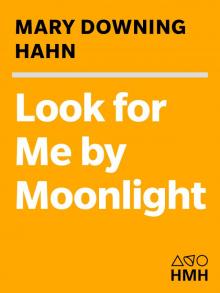 Look for Me by Moonlight
Look for Me by Moonlight The Old Willis Place
The Old Willis Place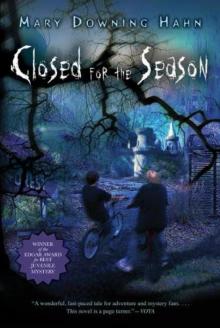 Closed for the Season
Closed for the Season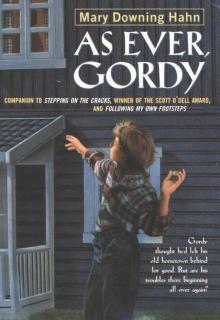 As Ever, Gordy
As Ever, Gordy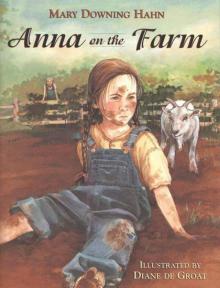 Anna on the Farm
Anna on the Farm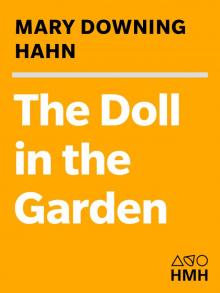 The Doll in the Garden
The Doll in the Garden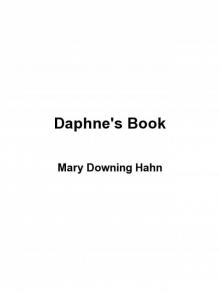 Daphne's Book
Daphne's Book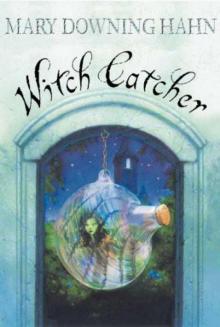 Witch Catcher
Witch Catcher The Gentleman Outlaw and Me--Eli
The Gentleman Outlaw and Me--Eli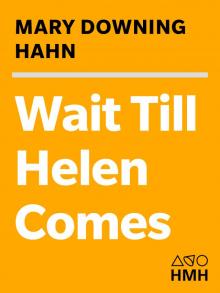 Wait Till Helen Comes
Wait Till Helen Comes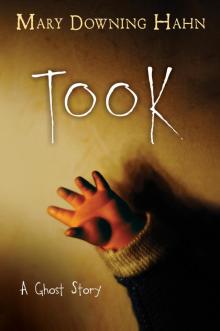 Took
Took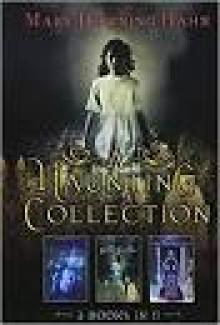 A Haunting Collection
A Haunting Collection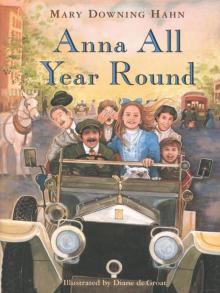 Anna All Year Round
Anna All Year Round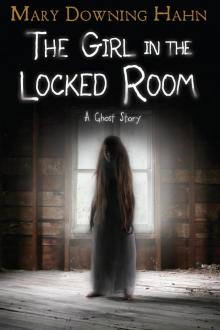 The Girl in the Locked Room
The Girl in the Locked Room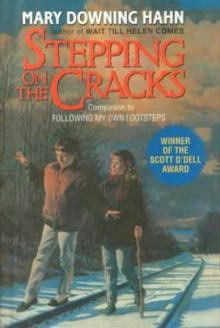 Stepping on the Cracks
Stepping on the Cracks